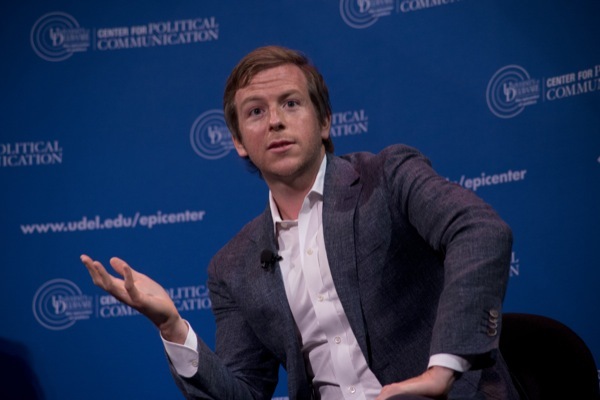National Agenda 2014: Peter Hamby
CNN’s Hamby discusses political reporting in the digital age

3:49 p.m., Oct. 2, 2014–CNN Digital national political reporter Peter Hamby wonders whether the exploding use of social media to cover political campaigns may actually be pushing candidates further away from the press and the public.
The changing nature of campaign coverage in the Internet age was one of several issues Hamby addressed during his “The Boys on the Bus? talk as part of the University of Delaware’s National Agenda speaker series on Wednesday evening, Oct. 1, in Mitchell Hall.
While the title of Hamby’s presentation is a nod to author Timothy Crouse’s book about reporters who accompanied the candidates during the 1972 presidential election campaign, Hamby said that the 2012 election marked a major difference in election coverage.
Hamby’s observations on campaign coverage with a corps of reporters tweeting and using Instagram, Facebook and the iPhone also were worked into the paper “Did Twitter Kill the Boys on the Bus? Searching for a Better Way to Cover a Campaign,” which he wrote while a fellow at Harvard University’s Shorenstein Center in 2013.
“I covered Mitt Romney’s campaigns in 2008 and 2012, and I have seen some really drastic changes take place in the way campaigns are covered,” Hamby said. “While I was doing this fellowship, I decided to write an analysis about how Twitter, specifically, has changed the dynamic of the campaign. Twitter has accelerated the 24-hour news cycle to a 24-second news cycle, with something happening every minute.”
While Twitter is the first thing reporters and political operatives look at from dawn to late at night, the advent of the smart phone has also changed the “traditional relationship between candidates and their campaign,” Hamby said.
“During the 2012 campaign, the iPhone became something that scared them,” Hamby said. “It broke down the traditional wall between politicians and the pubic.”
The result, Hamby said, is that reporters actually have less accessibility to candidates because campaign managers see it as their job to keep a slight gaffe or stumble from blossoming into a full-blown story on various Twitter-linked sites.
“Mitt Romney could talk about energy or Russia or tax reform, and the same was true about Barack Obama,” Hamby said. “But, at the end of the day people were talking about silly micro-controversies that took off on Twitter.”
Question and answer session
During a question and answer session moderated by Ralph Begleiter, director of UD’s Center for Political Communication, Hamby fielded questions about covering politics and politicians.
Begleiter and Hamby noted that many veteran reporters long for the days when campaigns were covered in a way memorably described by the late Pulitzer Prize-winning author Richard Ben Cramer in his classic tome on the 1988 presidential campaign, What It Takes: The Way to the White House.
“Richard Ben Cramer’s book was an authoritative piece and an example of what you used to be able to do in covering a campaign,” Hamby said. “The old way was to find out what makes a candidate tick. I think that today we are being cut out of that process.”
In his opus, Cramer described what it was like to literally spend time with each of the six candidates, including Delaware’s Joe Biden, to see what they were really like and find out if they had what it takes to become president.
“I find that fewer and fewer people will now be going on the plane with the candidates. It costs about $10,000 a week, and you don’t get that much for doing it,” Hamby said. “There are a number of places where you can get in-depth information. The notion that you have to be on the pane to get information is flawed.”
Responding to a student question about what skills a reporter needs to cover politics in the age of social media, Hamby said that proficiency in electronic gadgetry is just one of many needed skill sets.
“You have to know how to write, and be aware of things like point of view and voice, and also be concise and clear in your writing,” Hamby said. “Try to become an expert on one or two different things and narrow your focus from there.”
The 2014 National Agenda speaker series, presented by UD’s Center for Political Communication, is free and open to the public.
The next speaker in the series, on Wednesday, Oct. 29, will be Teddy Goff, who was the digital director for President Barack Obama’s 2012 campaign.
This year, National Agenda alternates with a political film series and the next screening will be Dr. Strangelove or: How I Learned to Stop Worrying and Love the Bomb, at 7:30 p.m., Wednesday, Oct. 8, also in Mitchell Hall. This series, “Fade to Black: Dark Political Humor in American Film,” is moderated by Lindsay Hoffman, associate professor of communication.
Article by Jerry Rhodes
Photos by Duane Perry
